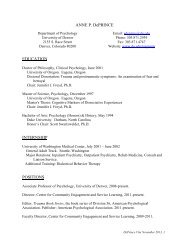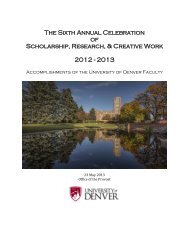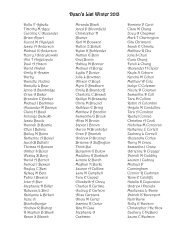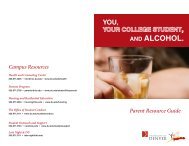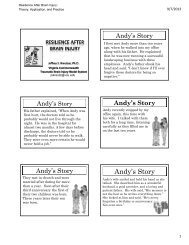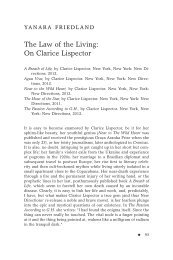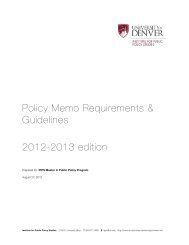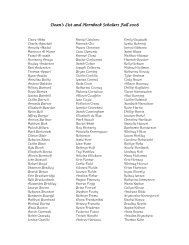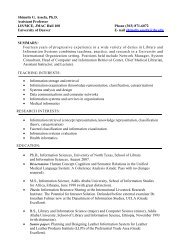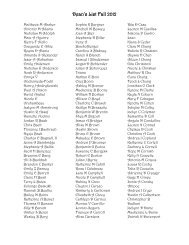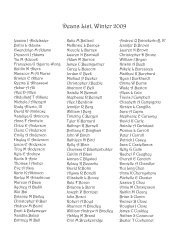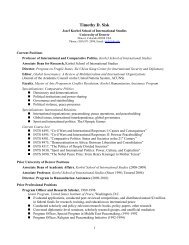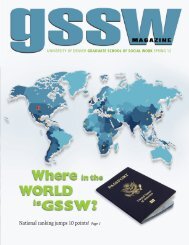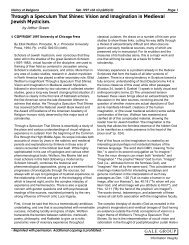Chien-Kai Chen, “China and Taiwan: A Future of Peace? A Study of ...
Chien-Kai Chen, “China and Taiwan: A Future of Peace? A Study of ...
Chien-Kai Chen, “China and Taiwan: A Future of Peace? A Study of ...
Create successful ePaper yourself
Turn your PDF publications into a flip-book with our unique Google optimized e-Paper software.
China <strong>and</strong> <strong>Taiwan</strong>: A <strong>Future</strong> <strong>of</strong> <strong>Peace</strong>? - 22<br />
Frank Hsieh, seemed to realize that he should not ignore these <strong>Taiwan</strong>ese businesspeople if he<br />
wanted to win the 2008 presidential elections. Although he criticized that creating a “cross-strait<br />
common market” as infeasible <strong>and</strong> too radical, he said that he would introduce a better policy to<br />
lift the unnecessary restrictions on the economic exchanges between China <strong>and</strong> <strong>Taiwan</strong>. In<br />
addition, in order to reassure the <strong>Taiwan</strong>ese businesspeople that he was willing to keep the<br />
<strong>Taiwan</strong> Strait peaceful <strong>and</strong> stable, he seldom discussed the issue <strong>of</strong> <strong>Taiwan</strong> independence in<br />
public <strong>and</strong> even made an argument that <strong>Taiwan</strong> is part <strong>of</strong> China according to the Constitution <strong>of</strong><br />
the Republic <strong>of</strong> China used in <strong>Taiwan</strong>. While Frank Hsieh’s new attitude towards cross-strait<br />
economic ties <strong>and</strong> cross-strait relations may attract some <strong>Taiwan</strong>ese businesspeople, these new<br />
attitudes actually destabilized the political collation <strong>of</strong> Pan-Green with <strong>Taiwan</strong>ese farmers <strong>and</strong><br />
unskilled workers. His pro-openness attitude angered many people who were not benefiting from<br />
the growing economic ties between China <strong>and</strong> <strong>Taiwan</strong>, <strong>and</strong> his ambiguous attitude towards the<br />
essence <strong>of</strong> the China-<strong>Taiwan</strong> relations alienated many Pan-Green, pro-<strong>Taiwan</strong>ese identity<br />
politicians. 5 The presidential election in 2008 was eventually won by the Pan-Blue c<strong>and</strong>idate, Ma<br />
Ying-Jeou, an advocate <strong>of</strong> more cross-strait economic exchanges <strong>and</strong> peaceful China-<strong>Taiwan</strong><br />
relations.<br />
Based on what I have discussed, we can find that the constantly growing economic ties<br />
between China <strong>and</strong> <strong>Taiwan</strong> not only created a cleavage between the people who were benefiting<br />
from these ties <strong>and</strong> those who were not, but also made the former politically stronger because <strong>of</strong><br />
the increase in their population <strong>and</strong> the importance <strong>of</strong> the role they play in <strong>Taiwan</strong>’s economic<br />
development. Although these people did not play a critical role <strong>and</strong> were ignored by the election<br />
winner in <strong>Taiwan</strong>’s 2004 presidential election, it is obvious that they attracted both Pan-Blue <strong>and</strong><br />
Pan-Green c<strong>and</strong>idates in 2008. The increase in the political <strong>and</strong> economical importance <strong>of</strong> this<br />
new constituency <strong>of</strong> people who were benefiting from the growing cross-strait economic ties<br />
even changed the Pan-Green, pro-<strong>Taiwan</strong>ese identity presidential c<strong>and</strong>idate’s attitudes towards<br />
the economic openness <strong>and</strong> the core <strong>of</strong> the China-<strong>Taiwan</strong> relations. This destabilized the political<br />
coalition <strong>of</strong> Pan-Green with the people who were not benefiting from growing cross-strait<br />
economic ties. These developments in <strong>Taiwan</strong>’s domestic politics greatly benefited the Pan-Blue,<br />
pro-Chinese identity presidential c<strong>and</strong>idate in the 2008 election. As mentioned before, if a pro-<br />
Chinese identity c<strong>and</strong>idate is elected, the likelihood <strong>of</strong> war in the <strong>Taiwan</strong> Strait would greatly<br />
decrease. The recent developments in China-<strong>Taiwan</strong> relations, such as the meetings between<br />
<strong>Taiwan</strong>’s quasi-<strong>of</strong>ficial Straits Exchange Foundation <strong>and</strong> China’s quasi-<strong>of</strong>ficial Association for<br />
Relations Across the <strong>Taiwan</strong> Strait in June <strong>and</strong> November 2008, demonstrate that the election <strong>of</strong><br />
Ma Ying-Jeou changed the confrontational nature <strong>of</strong> the China-<strong>Taiwan</strong> relations from 2000 to<br />
2008. In addition, it is worth mentioning again that the increasing political <strong>and</strong> economical<br />
importance <strong>of</strong> the people who were benefiting from the China-<strong>Taiwan</strong> economic ties forced the<br />
452, published by East Asia Institute at National University <strong>of</strong> Singapore on May 21, 2009, accessed through the<br />
web page <strong>of</strong> East Asia Institute at National University <strong>of</strong> Singapore (http://www.eai.nus.edu.sg/BB452.pdf).<br />
5 The publication <strong>of</strong> reports <strong>and</strong> editorials that criticized Hsieh’s position on the China-<strong>Taiwan</strong> relations in the<br />
Liberty Times, a pro Pan-Green newspaper, revealed the emerging gap between Hsieh <strong>and</strong> his potential supporters.<br />
See “Ma <strong>and</strong> Hsieh rush to China: <strong>Taiwan</strong>’s economy will be doomed in 2008” in the Liberty Times (November 26,<br />
2007), accessed through the web page <strong>of</strong> the Liberty Times<br />
(http://www.libertytimes.com.tw/2007/new/nov/26/today-fo2.htm); <strong>and</strong> “Hsieh’s argument that <strong>Taiwan</strong> is part <strong>of</strong><br />
China according to the Constitution <strong>of</strong> the Republic <strong>of</strong> China is the biggest obstacle to his success in the presidential<br />
election” in the Liberty Times (April 21, 2007), accessed through the web page <strong>of</strong> the Liberty Times<br />
(http://libertytimes.com.tw/2007/new/apr/21/today-fo2.htm).



